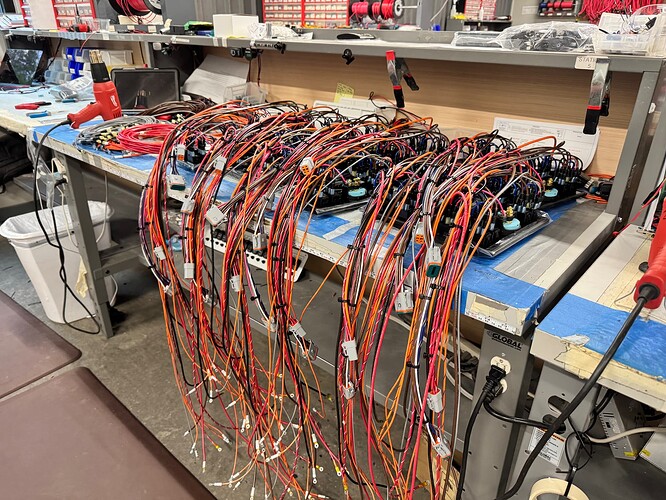ABYC Standard on the Crimp Tool
11.14.3.8 Solderless crimp-on connectors shall be attached with the type of crimping tools designed for the connector used, and that will produce a connection meeting the requirements of E-11.14.3.3.
11.14.3.3 The temperature rating of conductors and flexible cords shall be at least 140oF (60oC) dry.
11.14.3.4 All conductors and flexible cords shall meet the flame retardant and moisture resistant requirements of UL 83, Thermoplastic-Insulated Wires and Cables.
11.14.3.5 All conductors and flexible cords shall meet the requirements of the applicable standards of Underwriters Laboratories Inc.
1 Like
For a reference here’s a typical day here at New Wire Marine.  we make 10’s of thousands of crimp connections a year.
we make 10’s of thousands of crimp connections a year.
Use the right tools, techniques and crimp connections are the most robust way to connect a terminal or wire to wire connection.
6 Likes
How long did the connection last from when you did the work?
I recommend using the Ancor marine grade trailer wire. Its tinned, preventing corrosion running up the wire, and it comes with a Romex type jacket over the individual strands. The only issue with it is it does not have an extra conductor to do a home run on the ground wire.
Years ago I tried the standard trailer wire that comes with the lights, it never lasted. It always succumbed to corrosion on the strands no matter how diligent you make the connections. Its as if the cheap insulation is permeable.
Maybe water from the skiff once you re-load on the trailer and also after you wash it?
@DBStoots water intrusion would have to come from washing, and I would guess is the probable cause. Has to be, as it’s never been wet otherwise.
1 Like
@Tarponhead about a year n a half, giver take.
Going from memory a long time ago, seems when I used that wire that came with the lights it never lasted long, maybe 2 years…. So your time frame rings true. Thats why I stared using the Ancor trailer wire. I have done multiple trailers with it, and it outlasts the cheap stuff, well worth the cost penalty. You will just need to refine your connection practices to be robust (marine grade heat shrink).
Your in the PC area, correct? Maybe we can work out a time and I can help ya.
1 Like
Crawfordville.
Appreciate the offer. I’ve already gotten it straightened out though. I Was just asking, the why, so as to avoid the issue in the future.
1 Like
If you used the existing trailer wiring when you installed the lights, it might have had salt residue on the insulation which got covered up with your 24" heat shrink leaving your soldered connection as the weak link in a sealed salty environment. My best WAG haha
One of the reasons that soldered connection failed - where on a motorcycle it did not fail - is the actual installation itself (along with the fact that soldered connections aren’t flexible at all, and that trailer is getting salted down every time you retrieve your hull -whether you “dry launch” or not - from that wet boat itself). The big difference between your motorcycle wiring and the wiring on a trailer - is that on the cycle that wiring is supported in a harness where the boat trailer only has it supported periodically between your tow vehicle and the lights themselves along the trailer’s frame. In both instance you’re in a high vibration environment - but that boat trailer wiring is much more exposed in places where wind and road shocks affect it directly every time you hit the road. That motorcycle is as well - but the harness and very nature of the short wiring runs is an entirely different situation…
1 Like
